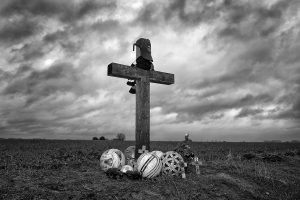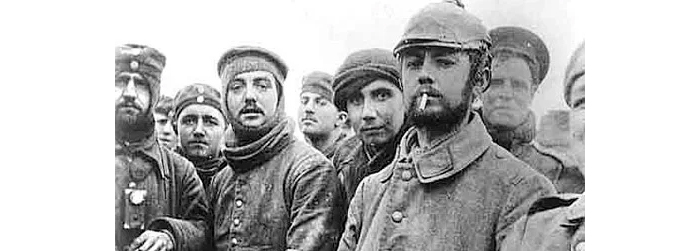During his early years of ministry, Paul loved Christmas. He enjoyed decorating the sanctuary. He took joy in the children’s programs. He sang the carols with gusto. He especially reveled in the annual Christmas Eve candlelight service.
But in December 2000, planning for Christmas Eve felt more like a battleground than a joyful preparation for a great celebration. He struggled to make meaning out of things he no longer could believe, including a virgin giving birth to a baby, angels singing in the sky, wise men seeking a newborn king, and a star hovering over the little town of Bethlehem.

Martin Thielen
He wasn’t sure what he actually believed anymore about “the Word becoming flesh.” And he felt disillusioned by the 2,000-year-old unfulfilled promise of “peace on earth, good will toward men.”
“How do I make peace with all of this?” Paul asked himself as he worked on his message for Christmas Eve. He felt like Ebenezer Scrooge shouting “humbug” while everyone else exclaimed “Merry Christmas!” He couldn’t remember a Christmas season so filled with professional struggle, personal angst and internal conflict.
In spite of this battle, Paul knew he had to plan a quality and meaningful service. Like most churches, Christmas Eve was the highlight of the year at Grace Church. Even with two services, the sanctuary could barely hold the overflowing crowds. However, as he tried to prepare a Christmas message he could preach with integrity, Paul felt totally stuck.
An unexpected windfall
And then, out of the blue, Paul received an unexpected windfall. It ended up being his best Christmas gift of the season. About a week before Christmas, a letter from a close friend arrived at the church office. Inside he found a photocopy of a magazine article. At the top of the page Paul found a short, handwritten note.
Paul,
I came across this true story in a magazine a few days ago. I thought you might enjoy it. Perhaps you could use it in a sermon. Sandra and I look forward to our dinner on Friday.
Richard
Christmas Eve at Grace Church
On Christmas Eve 2000, in the packed sanctuary of Grace United Church of Church, after all the opening songs, readings and prayers, Paul stood for his annual Christmas homily. He looked at the faces of the crowd and began his comments.
“Two days before Christmas, a woman frantically shopped for her last-minute gifts. She had her 4-year-old daughter in tow. The woman dragged her daughter from store to store. Exhausted, in a rush, and fighting the crowds, the woman felt more irritable by the minute. Finally, they made their last stop.
“As they walked out of the store, the mother said to her daughter, ‘Did you see that? That man at the checkout counter gave me a mean face.’
“Instead of being a joyful season, Christmas can sometimes feel like a battleground.”
“The daughter said, ‘No mommy, you had a mean face before you went into the store.’”
After everyone laughed, Paul said, “Instead of being a joyful season, Christmas can sometimes feel like a battleground. And speaking of Christmas and battlegrounds, I want to tell you a Christmas story a good friend recently shared with me. It’s a true story from the brutal days of World War I.”
Christmas on the Western Front in 1914
“Way back in the year 1914, on Christmas Eve, while much of the world fought that terrible war, a profound event happened on the Western Front. It was miserably cold, with temperatures below freezing and snow all over.
“On that Christmas Eve night, all across the German lines, lights begin to appear. At first, the British army expected the Germans to attack. But instead of rifle fire, sounds of singing drifted across no-man’s-land. To their great surprise, the British soldiers could hear the German soldiers singing ‘Stille Nacht,’ German for “Silent Night.”
“In response, the British soldiers decided to sing a Christmas carol of their own. This singing of Christmas carols went on, back and forth, for some time. After each song, the opposing troops applauded the other side’s singing. Eventually, the troops began lobbing food into the opposing trenches.
“Then several soldiers erected makeshift Christmas trees. In the darkness, you could see candles burning on the branches.

A wooden cross surrounded by footballs marks the field at Ploegsteert Wood, Flanders, where British and German soldiers played football during the World War One Christmas Day truce in 1914. The match in No Mans Land was played between soldiers of the Royal Warwickshire Regiment and a Saxon unit. (Photo by Tom Stoddart/Getty Images)
“The next morning, on Christmas Day, a few soldiers poked their heads above the trenches. But nobody fired a shot. One German captain stepped out into no-man’s-land, the land between the trenches. Not a round was fired.
“Then a British officer did the same. The two men met each other face-to-face in the middle of no-man’s-land, introduced themselves, and saluted each other. By now soldiers on both sides wildly cheered. It became clear that nobody would die that day. An unofficial truce had been called.
“Throughout the day, both sides collected their dead and buried them. At one point soldiers from both sides gathered to honor their fallen. Together they read Psalm 23, in both German and English: ‘Yea though I walk through the valley of the shadow of death, I will fear no evil.’
“Later in the day, soldiers from both sides showed pictures of their girlfriends and families to one another. Then they shared Christmas treasures of chocolate and cigarettes. Eventually, they all joined together in a pickup game of soccer.
“The next morning, on December 26, at 8:30 a.m., a British captain fired three shots into the air. He then raised a flag that said, ‘Merry Christmas.’
“The Germans responded by hanging out a sheet that said, ‘Thank You.’ The German captain and the British captain both stood up from the trench, bowed and saluted each other, shot into the air, and the war was on once again.”
A Christmas reprieve
Paul continued, “On this Christmas Eve, you and I are not soldiers in war. But most of us are fighting a battle of some kind. Maybe a battle with illness. Or a battle to save our marriage. Or a battle with our grown children. Or a battle at our job. Or a financial battle. Or a battle with religious doubt. Or one of a hundred other battles.
“At Christmas, God gives us a break in the fighting. God gives us a truce from the war.”
“And as Christians, we are all engaged in a battle, or at least we should be. As soldiers of the kingdom of God, we are called daily to do battle against injustice and human suffering of all kinds. But at Christmas, God gives us a break in the fighting. God gives us a truce from the war. On Christmas Eve and Christmas Day, God lets us stop the fighting and enjoy the gift of Christmas.
“During this reprieve, this time of R and R, God reminds us we are not alone in the world. He reminds us that Immanuel has come, that God is with us no matter what battles we face.
“And God also reminds us that we are part of a church family — part of a fellowship of friends who are called to support one another in all of life’s battles, from birth to death. On this sacred night, God allows us to sing the songs of Christmas and hear the story of Jesus and gather around the table for the sacrament of Holy Communion and light candles in celebration of Jesus, the Light of the world.
“Oh, I know,” Paul added, “The day after Christmas, on December 26, we’ll have to reenter the battle once again. That’s just the way life is. But tonight, for just a moment, God has called a Christmas truce. Let us enjoy the reprieve and be glad. Amen.”
After the service was over, Paul, Sarah, Hope and Joy went home, exchanged gifts and ate their annual post-Christmas Eve service dinner of pancakes and sausage. Then they watched, as they did every year, It’s a Wonderful Life. In the joy of that moment, Paul forgot about his struggles with faith, at least for a while. It was a welcome truce, indeed.
NOTE: This story comes from the author’s novel, An Inconvenient Loss of Faith. A free copy of the novel is available here.
Martin Thielen, former editor of Proclaim magazine and retired United Methodist minister, is the creator and author of www.DoubtersParish.com.

